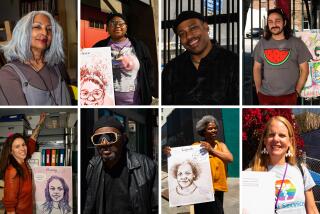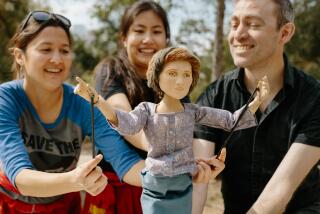THEY TELL STORIES : Listen, Children, and You Shall Hear . . . Folklore From All Kinds of Folks
- Share via
In the competitive arts world, where possessing that “special something” can mean the difference between a paycheck and the unemployment line, many artists prefer to keep their creative secrets to themselves. Not so with Carl Weintraub and the members of We Tell Stories. For this family-oriented troupe, emulation by their audience is not something to tolerate, it’s their raison d’etre.
“Kids should take a look at everything we do, even the acting--especially the acting--and say ‘I can do that,’ ” said Weintraub during a phone interview from the company’s L.A. office.
Tonight, We Tell Stories opens Anaheim’s Just For Kids season at Pearson Park with a performance of “The Spirit of Black Folklore,” a collection of folk tales and literature from African-American culture. The low-cost series, which was cut last year from the city budget but saved by grants from the Leo Freedman Foundation and Target stores, continues each Thursday evening through Aug. 19. This season, a wide variety of storytelling styles will be featured along with youth-oriented music, dance and magic performances.
To make their tales more accessible to children, and to keep attention focused on the words instead of flashy visuals, We Tell Stories keeps things simple, said Weintraub. Props, what there are of them, are made with items that could have easily been found in the family rag bag: a red glove stuck on top of a head is a chicken’s comb; a big box trimmed with fabric scraps serves as a lion costume.
Casts are small so that the players can take on a wide range of characters, and hopefully inspire their listeners to do the same. Tonight’s program in Anaheim features Gerald James and Valeri Ross along with Weintraub. Children are routinely drawn from the audience to fill out the cast; in “Black Folklore,” said Weintraub, they may be called upon to play anything from mice to “frog homeboys.”
Type-casting, by necessity and by design, is rarely seen.
“We want the kids to see that one person can be a lot of different things,” said Weintraub, whose 30-member company performs (in casts of varying numbers) in schools, community centers and theaters on both coasts. “We want them to see guys playing girls, girls playing guys, people playing animals or trees.”
The flexible casting policy is common throughout We Tell Stories’ repertoire, which includes “Proud To Be Me,” a multicultural collection of stories designed to instill pride; “Ancient Wisdom,” a collection of Asian stories, and “Let Them Eat Books,” a show about language that includes tales by Aesop, Twain and Thurber.
But, as Weintraub is quick to point out, there are some cases in which roles should be cast according to race in order to give the story its full weight. One of those is the tale of John Henry, a black folk hero of such enormous strength and determination that he outperformed a steam drill in a contest.
“Kids perceive things as much with their eyes as with their ears, and if you make John Henry a white man, they’ll go away seeing him as a white man,” explained Weintraub.
Geared to kindergartners through adults, tonight’s performance may also include “The Lion in the Well,” “The Frog Who Wanted to Sing,” and Nora Neale Hurston’s dramatic monologue “High John De Conquer.” A Brer Rabbit tale is also included, despite complaints from some blacks that it puts the African-American culture in a bad light. (By the way, Weintraub says his company does not use the original stories’ Old South black dialect that some find offensive.)
“I can see the feelings against the Uncle Remus book (because he was) a white man writing down black stories,” acknowledged Weintraub, who was once angrily reprimanded by a black teacher after telling the tale to a school group.
“The point is, you can’t cut off your history; this is phenomenal stuff.”
Although schools routinely book his company to boost students’ interest in books, Weintraub says he’s more concerned about igniting a passion for the spoken word that he feels Americans no longer possess.
“Literacy is almost beside the point. To me, it’s communication that’s the only thing that can save the world. And storytelling is the art form of communication.”
More to Read
The biggest entertainment stories
Get our big stories about Hollywood, film, television, music, arts, culture and more right in your inbox as soon as they publish.
You may occasionally receive promotional content from the Los Angeles Times.










